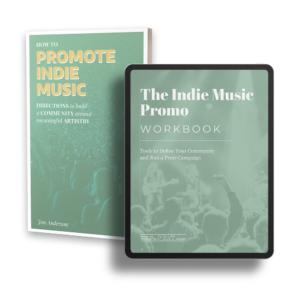I’ve gotten the same question from a few people recently:
“Can I build a fanbase if I’m not making ‘mainstream’ music?”
It’s a good question.
Some people are in a niche genre, like Indian classical music or avant-garde metal. Some people are getting back into making music after a previous career and they feel like they’re too old – like what they’re doing doesn’t connect with what they see artists doing on social media (man I feel this way and I’m 28).
So, can you “make it” if you’re not making mainstream-ish music for a mainstream-ish audience?
Yes, with two caveats:
1. You’ve got to define “make it.”
If you’re 65 years old, you aren’t going to be the next Olivia Rodrigo. If you’re creating avant-garde narrative albums using found sounds, you aren’t going to release the next “Old Town Road.”
In other words, if you’re making niche music, “making it” probably won’t look like household name recognition.
It’ll look like a committed fanbase that supports your music and provides you with the means to make it for a living. While the size of the fanbase might vary, this is absolutely possible in most niches.
2. In all honesty, sometimes the answer is actually no.
I know this is lame, but it’s reality. I’m sorry.
Think of it from a business perspective – no, there is not a market for every product. Before a company like P&G puts out a new thing, they do a ton of market research to find out if enough people will buy it to actually make it profitable.
They only make what sells.
Artists typically start from the other side of the process, which is why they’re awesome: “I will make this, profit be damned, because it’s meaningful.” They usually ask the profit question only after the thing has been made.
The truth is that, because this is how most creatives create, they sometimes make music that is too introspective / different / niche to resonate with enough people to “make it.”
Two caveats to this caveat:
1) Virtually any kind of music can build some kind of fanbase and establish some kind of meaningful community.
2) Any skilled artist can build a big enough community to “make it,” but they may have to change the type of art they’re making to do so.
I think all of this leads to two questions:
1. How do I know if my music is too niche for me to “make it”?
The best way to figure out if you can “make it” with your music is to do a little bit of market research of your own.
See if you can find any other artist that’s doing what you want to be doing at the level you want to be doing it at.
Search social media. Use Google. Ask friends who like your music what acts it reminds them of. Ask artists you’ve worked with for frames of reference.
If you can find 10 acts that represent what it means to “make it” in your niche, then your niche is make-able. If you can’t find 3, then the reality is it’s going to be pretty hard.
It may not be impossible, but to succeed you’ll have to be a trailblazer, and that’s difficult.
2. How do I actually reach a niche audience?
Skywriting. Everyone has to look up sometime, right?
In seriousness, the answer is that it depends. Again, I’m sorry.
I’ve done marketing for very niche products (electron microscope services, data replication software, etc.), and the key to doing it well is finding out where target customers are and how they buy.
Different audiences buy in different places.
The same thing’s true for niche music. You’ve got to find out where your target audience spends time, how they find music like yours, and how they listen to it.
The fastest way to do this is to look at the artists that have “made it” in your niche and see where they’re most active.
For 90% of artists, I recommend using mainstream platforms, but some niches require thinking outside the box.
So, go back to those 10 artists you found. Are they mostly doing livestreams on Twitch? Did they build up their fanbase through touring? YouTube? Is their biggest platform Facebook? Tik Tok? Pinterest(!)?
Use their success as a blueprint – don’t copy everything, but at least make sure you’re fishing in the right pond.
Social media ads can also work for reaching very niche audiences.
You know the drill. Demographics, interests, creepy personal data – it’s all there on social platforms.
Running ads will cost you / burn your money, but it’ll also help you to do your own market research and validate that what you’re doing resonates when it gets in front of the right eyes.
(To that end, here’s my post from a few weeks ago on how to use social ads well.)
Final thought: Making music matters more than “making it.”
Reading back, I’ve realized that this post turned out to be kinda discouraging. Look, here’s the bottom line: If you want your art to be a means to an end (profit / building a fanbase), you may have to adapt it. That’s the reality.
But if you like your music, you should keep making it.
Because the beautiful thing about art is that it’s fulfilling in itself – it is its own end, not a means to something else (like profit).
At the end of the day, whether you can build a career from it or not, your music matters because it’s your music.
So, as always, please keep making it.

